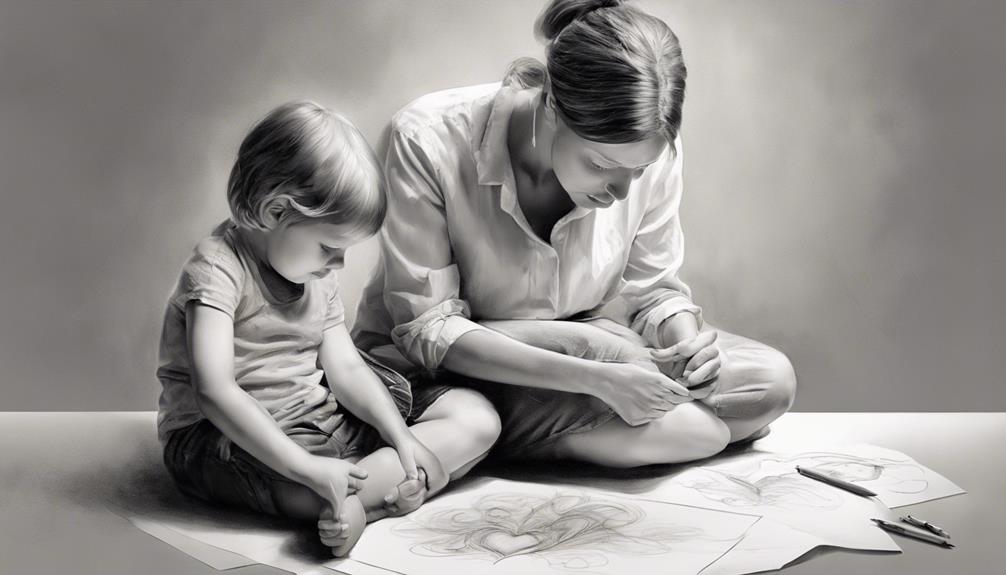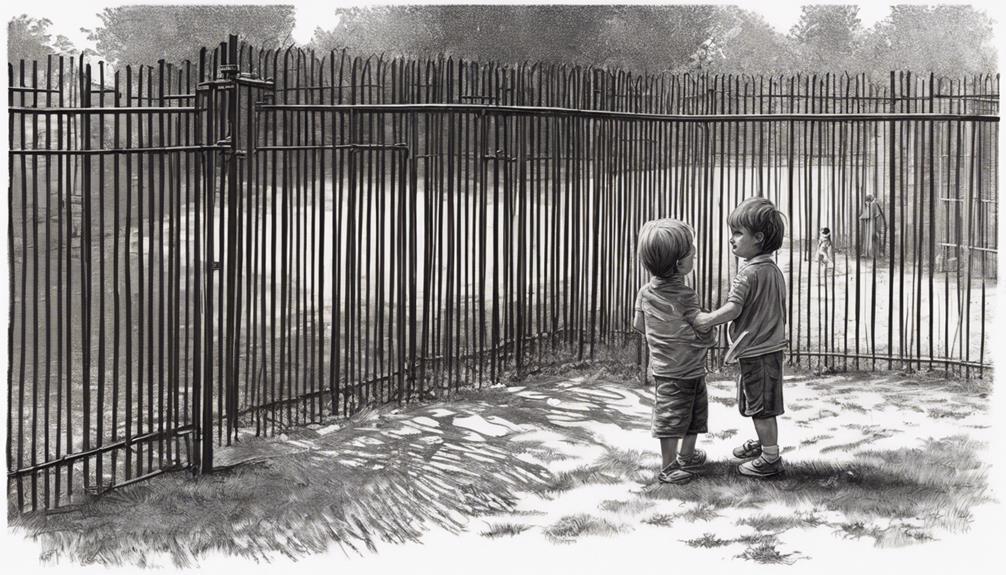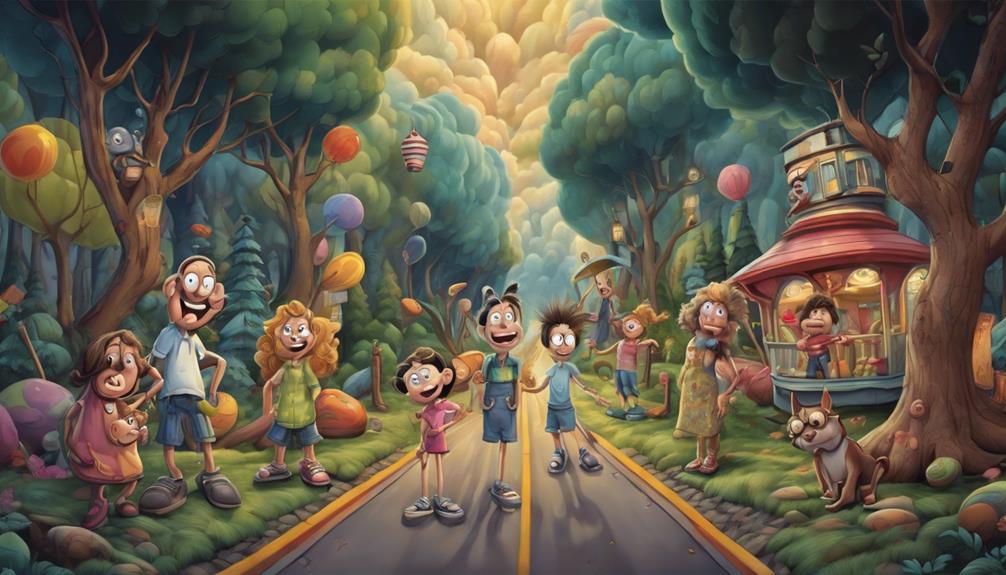Dealing with a narcissistic co-parent during a divorce can present obstacles, especially when it comes to protecting your children’s welfare.
The subtle manipulations and emotional toll that a narcissist can impose on their offspring are often overlooked or underestimated.
However, there are effective strategies and tools that can help mitigate these impacts and create a more stable environment for your children.
By understanding the dynamics at play and implementing proactive measures, we can equip ourselves with the necessary skills to protect our children and guide them through this difficult terrain with resilience and strength.
Key Takeaways
- Recognize narcissistic behavior to prevent harm to children.
- Establish clear boundaries to shield children from manipulation.
- Prioritize child well-being in legal decisions for safety.
- Communicate openly with children about divorce to offer support.
Recognizing Narcissistic Behavior in Co-Parenting
Recognizing narcissistic behavior in co-parenting is crucial for safeguarding children's emotional well-being during and after a divorce. When dealing with a narcissistic co-parent, it's essential to be aware of the manipulation tactics they may use to control the narrative and influence the children. Gaslighting, guilt-tripping, and emotional abuse are common strategies employed by narcissists, leaving children feeling confused, anxious, and torn between their parents.
Signs of narcissistic behavior in co-parenting include a lack of empathy towards the children's needs, constantly seeking validation and admiration, and an inability to take responsibility for their actions. These behaviors can have a detrimental impact on children's emotional development and sense of security. As co-parents, our priority should be to protect our children from such harm by staying vigilant, setting boundaries, and seeking support when needed.
Establishing Clear and Consistent Boundaries
When co-parenting with a narcissist, establishing clear and consistent boundaries is vital for protecting children's emotional well-being and promoting a healthy environment. Clearly outlining rules and expectations for interactions with the narcissistic parent provides structure and consistency for the children.
It's essential to set boundaries regarding communication methods and frequency to prevent emotional manipulation and maintain a sense of control. Consistently reinforcing consequences for boundary violations demonstrates the importance of respecting established rules.
Avoiding power struggles or arguments with the narcissistic parent in front of the children fosters a peaceful environment. Seeking support from a therapist or counselor can help develop healthy boundary-setting strategies tailored to the specific dynamics of co-parenting with a narcissist.
Prioritizing Child Well-Being in Legal Proceedings
In legal proceedings, our primary focus must always be on safeguarding the well-being of the children involved. When navigating high-conflict divorce situations with a narcissistic parent, it becomes crucial to prioritize child-centered outcomes. Here's how we can ensure the protection of children in legal proceedings:
- Advocate for Child-Centered Outcomes:
Legal professionals should actively advocate for custody arrangements that prioritize the emotional well-being and safety of the children above all else.
- Consider Impact on Children:
When determining child custody arrangements, the court must carefully consider how decisions will impact the children's development and relationships with both parents.
- Shield Children from Manipulative Behavior:
It's essential to shield children from the manipulative and harmful behavior often exhibited by a narcissistic parent during divorce proceedings.
- Promote Safety and Stability:
Court decisions should focus on promoting a sense of safety, stability, and security for the children, ensuring they're protected from the turmoil of the legal process.
Communicating Effectively With Children About Divorce

Understanding the importance of age-appropriate communication is key when talking to children about divorce to ensure clarity and minimize confusion. It's essential to reassure children that the divorce isn't their fault and that both parents still love them deeply. Encouraging open dialogue creates a safe space for children to express their feelings and ask questions as they navigate this challenging time.
While it's natural to want to shield children from the conflicts and details of the divorce, it's crucial for their emotional well-being. By communicating effectively and honestly without burdening them with adult issues, we can protect their mental and emotional health during this process.
In some cases, seeking the help of a child therapist or counselor can provide additional support for children as they cope with the changes brought on by the divorce. These professionals are trained to assist children in understanding and processing their emotions, offering valuable guidance and tools to navigate this difficult time. Prioritizing clear, open communication and emotional support can help children feel more secure and resilient as they adjust to the changes in their family dynamic.
Seeking Professional Support for Children's Emotional Health
Seeking professional support for children's emotional well-being during divorce proceedings with a narcissistic parent is crucial in ensuring their mental resilience and ability to navigate the challenges ahead. When it comes to protecting children and helping them cope with the emotional turmoil of divorce, considering counseling or therapy is a proactive step towards their well-being.
Here's how professional support can benefit children:
- Tools for Processing Feelings: Counseling or therapy provides children with tools to understand and process their emotions effectively.
- Age-Appropriate Guidance: Therapists specializing in children's emotional health can offer tailored guidance suitable for their age and developmental stage.
- Coping with Co-Parenting Challenges: Professional intervention equips children with strategies to navigate the complexities of co-parenting with a narcissistic parent.
- Building Resilience: Emotional well-being sessions empower children to express themselves and build resilience, fostering their ability to cope during the divorce process.
Frequently Asked Questions
How Do You Outsmart a Narcissist in a Divorce?
We outsmart a narcissist in a divorce by staying focused on our well-being and legal protection. We document interactions, set boundaries, follow court orders, and seek support. By prioritizing ourselves and our children, we navigate the challenges effectively.
Do Judges Recognize a Narcissist?
Recognizing a narcissist in court can be tricky. Judges may miss subtle signs. Clear evidence is key. Educating judges about narcissistic traits helps. Familiarity with personality disorders aids recognition. Expert witnesses play a crucial role.
How Do You Beat a Narcissist in Divorce Court?
We gather evidence, work closely with expert lawyers, and focus on our children's well-being. By documenting interactions and utilizing court resources, we ensure our case is strong and protective of our family's best interests.
How Do Narcissists Treat Their Children During a Divorce?
We need to understand how narcissists treat their children during a divorce. They may manipulate, neglect, and confuse them, prioritizing their needs over the kids'. Loyalty tests and emotional distress can harm children. It's crucial to protect them from this toxic behavior.
How Can I Protect My Children From a Narcissistic Parent During a Divorce?
Navigating a divorce requires kidfriendly divorce coping strategies, especially when dealing with a narcissistic parent. Empower children with reassurance and love, fostering a safe environment. Encourage open communication and healthy expression of feelings to shield their emotional wellbeing during this challenging transition.
Conclusion
In conclusion, protecting children from a narcissist during divorce is crucial for their emotional well-being.
Did you know that children of narcissistic parents are more likely to experience anxiety and depression?
By recognizing narcissistic behavior, setting boundaries, prioritizing their well-being, and seeking professional support, we can create a safe and stable environment for our children to thrive despite the challenges of divorce.
Remember, their resilience and strength are our top priority.










